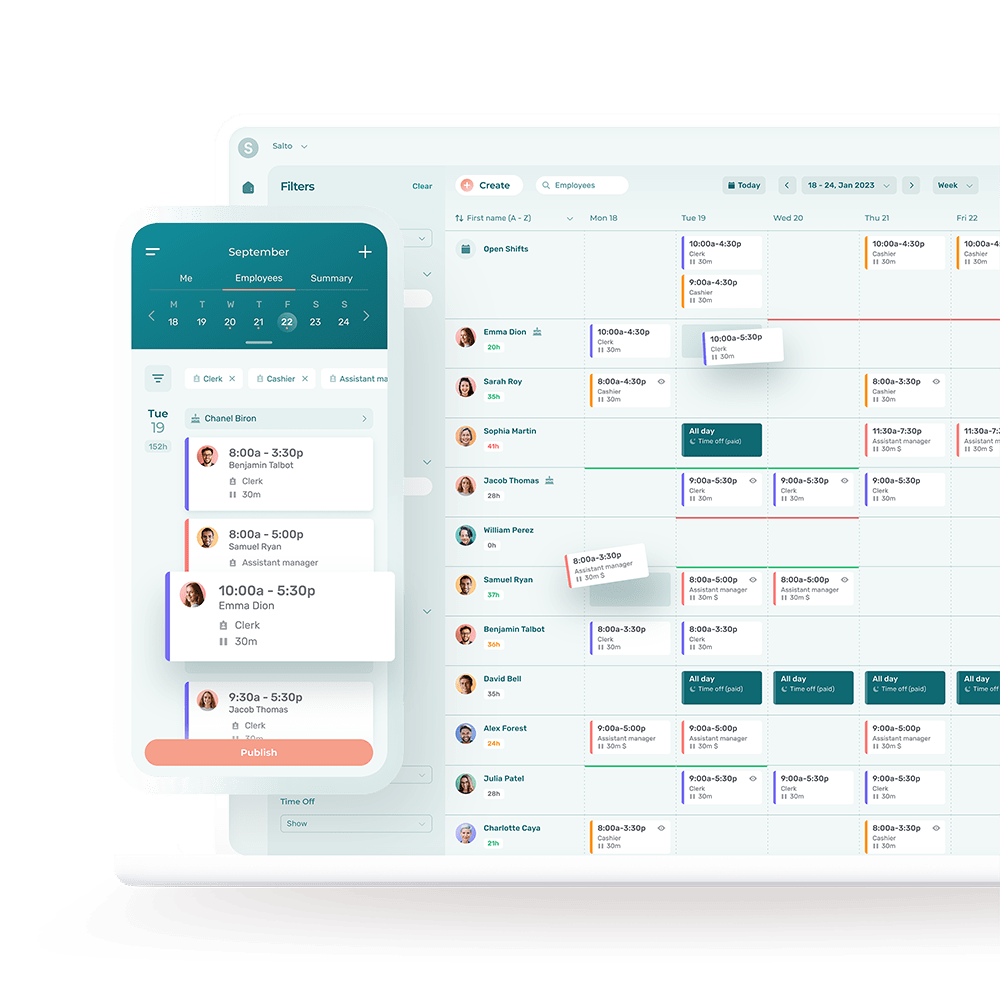Employees with a positive attitude at work can greatly influence the rest of their team and achieve their goals more quickly and easily.
With a positive attitude, it’s generally easier to overcome obstacles and find solutions to the problems we face.
Having employees with a positive attitude at work has multiple benefits: increased productivity, team motivation and commitment, lower employee turnover, reduced stress, and so on.
Fostering a positive attitude also helps employees to be happier at work. And when employees feel good, customer service is often better and customers have a more pleasant experience.
Obviously, as a manager, you can’t force your employees to have a positive attitude. But there are many things you can do to encourage them to be more positive.
In this article, you’ll learn what a positive attitude at work is and how to develop and foster a positive mindset in your team. I’ll also give you a bundle of the best tips for keeping a positive attitude at work for both yourself and your staff.
A Positive Attitude at Work Means…
Being positive at work requires being optimistic and trying to find solutions to the problems that come our way. Positive people are also generally resilient and grateful.
Mind you, being positive all the time isn’t really desirable. Simply because some situations can make us angry, be disappointing or difficult, and it’s important to leave room for these emotions. However, it is possible to maintain a positive attitude even in the face of adversity.
Building a Work Team That Gets Along Well
Surrounding yourself with positive people is the simplest and most effective way of fostering a good state of mind in your team.
People with a positive attitude tend to naturally influence their colleagues to be positive too. So trying to build a team of positive leaders is one of the best ways to foster positivity at work.
Pay attention to candidates’ personalities when you’re in the recruitment process. Make sure you hire employees who see solutions and learning opportunities rather than problems and pitfalls.
Use personality tests to evaluate candidates. Ask your current employees to take a test too, to get the big picture of your team as a whole.
Make Time for Team-Building
To help your team get along, organize team-building activities on a regular basis. They don’t have to be complicated. You can simply plan coffee breaks where you encourage your employees to talk about anything but work.
If you have more budget and resources, you can invite your employees to a cooking workshop or wine tasting. It’s up to you to decide which activities might be of interest to your team members.
In addition to formal team-building activities, you should also encourage friendly relations and collaboration between your employees. It’s to your advantage if employees get on well together. In fact, research has shown that having good relations with work colleagues increases employee satisfaction, well-being and performance.
Lead by Example
Don’t forget to set an example and adopt a positive attitude yourself. As mentioned previously, it’s normal not to be positive at all times, in all situations. The important thing is to be able to return to a positive frame of mind as soon as possible.
Plan Everyone’s Tasks
One of the main aspects that can generate frustration or a negative attitude in your employees is the nature of the work to be done. Simply put, the tasks you give your employees directly influence their mood. And if tasks and responsibilities are not clear between departments, this can lead to a lot of problems.
Take the time to draw up clear, detailed job descriptions. Write down everyone’s responsibilities, so that you can clearly define the playground for each member of your team.
For example, in a restaurant, it’s essential that each team knows what their tasks are, in order to limit conflicts. So, clarify with your waiters and your kitchen staff what is their responsibility, so that they stop throwing the ball back and forth about certain tasks.
Support Your Employees
Make sure you offer a variety of tasks, and try to avoid redundancy. If this isn’t possible due to the nature of your business, see if you can offer your employees development opportunities to reduce monotony.
Conduct performance reviews and one-on-one meetings with your employees more regularly. This way, you can resolve problems quickly and ensure that your employees are still happy in their roles.
Adopt Positive Management Methods
The management methods you adopt on a daily basis may or may not create a healthy, positive working environment…
As a manager, there are many things you can do to ensure the well-being of your employees. And happy employees are generally positive, motivated and productive employees.
Say Thanks More Often
Recognizing the work of your employees is probably the simplest and most effective way of fostering a positive work environment. Highlight your team members’ achievements on a regular basis. Be sincere and don’t hesitate to congratulate your employees on their successes publicly.
Some employee scheduling software, such as Agendrix, even offer tools to simplify employee recognition in the workplace.
Along the same lines, don’t hesitate to give feedback to your employees. It will be easier for them to know what they’re doing well and what they need to improve. Support them when they’re struggling, and offer them more autonomy and flexibility when they’re doing well.
And don’t forget to encourage them to rest, whether by taking well-deserved breaks, vacations, or even sick days when necessary.
If necessary, send out an employee satisfaction survey to take the pulse of your team’s morale.
Offer More Flexibility
To simplify your management methods, equip yourself with the right work tools. For example, if you have to manage a team with variable working hours, such as in a pharmacy, grocery store, restaurant or retail business, use scheduling software.
In this way, you can ensure that your employees’ availability is respected, offer them flexible schedules and reduce frustrations linked to scheduling or payroll errors.
Trust your team and offer them the flexibility they need to thrive at work and at home.
Our Best Tips for a Positive Attitude at Work
- Surround yourself with positive people
- Celebrate the achievements of your team members (and your own)
- Offer opportunities for skills development
- Be flexible
- Encourage a balance between personal and professional life
- Build strong professional relationships and friendships
- Limit stress at work
- Encourage teamwork
- Give more feedback
- Offer a variety of tasks to your employees
- Lead by example
- Encourage your employees to rest











